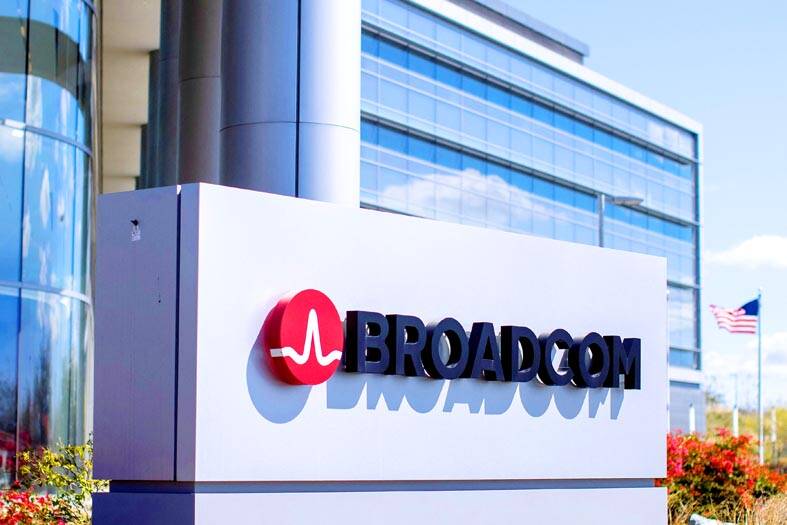Broadcom Inc, a chip supplier for Apple Inc and other big tech companies, rallied in premarket trading after predicting a boom in demand for its artificial intelligence (AI) chips.
Sales of AI products would gain 65 percent in the fiscal first quarter, far faster than its overall semiconductor growth of about 10 percent, the company said during a post-earnings conference call.
The chipmaker also predicted that the potential market for AI components it designs for data center operators would reach as high as US$90 billion by fiscal 2027.

Photo: Reuters
Like Nvidia Corp, Broadcom is positioning itself to be a major beneficiary of the AI spending frenzy. The company has won two major new hyperscale customers — the biggest operators of data centers, Broadcom chief executive officer Hock Tan said.
The stock rose as much as 15 percent in premarket trading on Friday before New York exchanges opened, putting the share price on track for an all-time high if the gain holds when regular trading begins. It had been up 62 percent this year to close at US$180.66.
Investors have piled into Broadcom’s stock this year, lured by AI optimism. The Palo Alto, California-based company had predicted that it would get more than US$10 billion in annual revenue from that market, outpacing other parts of its business. Ultimately, the number reached US$12.2 billion in the last fiscal year.
AI revenue grew 220 percent during the year, fueled by demand for processors and networking components, Tan said.
Demand for non-AI chips would be down in the first quarter, he said, adding that total sales would be US$14.6 billion in the period ending January, in line with estimates.
Tan has assembled one of the most valuable companies in the chip industry through a string of acquisitions. He has also built a software unit that is approaching the scale of its semiconductor operations. That has made the company’s forecasts a bellwether for a broad swath of the technology industry.
Profit was US$1.42 a share in the fourth quarter, excluding some items, the company said. Revenue rose to nearly US$14.1 billion in the period, which ended Nov. 3. Analysts had estimated US$1.39 a share in earnings and revenue of US$14.1 billion on average, according to data compiled by Bloomberg.
Data center providers rely on Broadcom’s custom-chip design and networking semiconductors to build their AI systems. The company also sells components for cars, smartphones and internet access gear. Its push into software, meanwhile, includes products for mainframe computers, cybersecurity and data center optimization.
Broadcom’s semiconductor division had revenue of US$8.23 billion in the fourth quarter, up 12 percent. Software sales grew nearly 200 percent to US$5.82 billion. The company is much larger than it was a year ago, partly because of its acquisition of VMware Inc, which it bought for roughly US$69 billion.
Prior to the report, analysts raised concerns that Broadcom’s chip-design business was suffering from weaker demand. They cited the slower introduction of a new version of a Broadcom processor for Alphabet Inc.
Apple is a top customer of Broadcom, which provides components for the iPhone. During earnings calls, Tan typically gives updates on Broadcom’s often-contentious relationship with that company, which he refers to as his “large North American customer.”

Semiconductor business between Taiwan and the US is a “win-win” model for both sides given the high level of complementarity, the government said yesterday responding to tariff threats from US President Donald Trump. Home to the world’s largest contract chipmaker, Taiwan Semiconductor Manufacturing Co (TSMC, 台積電), Taiwan is a key link in the global technology supply chain for companies such as Apple Inc and Nvidia Corp. Trump said on Monday he plans to impose tariffs on imported chips, pharmaceuticals and steel in an effort to get the producers to make them in the US. “Taiwan and the US semiconductor and other technology industries

SMALL AND EFFICIENT: The Chinese AI app’s initial success has spurred worries in the US that its tech giants’ massive AI spending needs re-evaluation, a market strategist said Chinese artificial intelligence (AI) start-up DeepSeek’s (深度求索) eponymous AI assistant rocketed to the top of Apple Inc’s iPhone download charts, stirring doubts in Silicon Valley about the strength of the US’ technological dominance. The app’s underlying AI model is widely seen as competitive with OpenAI and Meta Platforms Inc’s latest. Its claim that it cost much less to train and develop triggered share moves across Asia’s supply chain. Chinese tech firms linked to DeepSeek, such as Iflytek Co (科大訊飛), surged yesterday, while chipmaking tool makers like Advantest Corp slumped on the potential threat to demand for Nvidia Corp’s AI accelerators. US stock

The US Federal Reserve is expected to announce a pause in rate cuts on Wednesday, as policymakers look to continue tackling inflation under close and vocal scrutiny from US President Donald Trump. The Fed cut its key lending rate by a full percentage point in the final four months of last year and indicated it would move more cautiously going forward amid an uptick in inflation away from its long-term target of 2 percent. “I think they will do nothing, and I think they should do nothing,” Federal Reserve Bank of St Louis former president Jim Bullard said. “I think the

‘LASER-FOCUSED’: Trump pledged tariffs on specific sectors, including semiconductors, pharmaceuticals, steel, copper and aluminum, and perhaps even cars US President Donald Trump said he wants to enact across-the-board tariffs that are “much bigger” than 2.5 percent, the latest in a string of signals that he is preparing widespread levies to reshape US supply chains. “I have it in my mind what it’s going to be but I won’t be setting it yet, but it’ll be enough to protect our country,” Trump told reporters on Monday night. Asked about a report that incoming US Secretary of the Treasury Scott Bessent favored starting with a global rate of 2.5 percent, Trump said he did not think Bessent supported that and would not